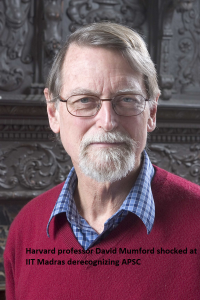
“Harvard professor expresses shock at the censorship of free speech in IIT Madras”, read a breathless headline of an article on the website of our usual culprit. David Mumford is an emeritus professor of mathematics at Harvard, president of the International Mathematical Union, and a Fields Medal winner. He has written a letter to the director of IIT Madras stating that he sees significant similarities between the Dalit struggle in India and the African-American social justice struggle in the US, and that, since he is a strong supporter of absolute free speech, he is shocked that a group of students has been summarily derecognized. He also mentions in passing that he considers Dr Ambedkar to be his hero.
The hypocrisy or ignorance of David Mumford
Free speech is an enduring value that one cannot afford to compromise in a country that aspires to embody a democratic rule of law. Having said that, it is also essential to understand that in this day and age of social media, expressing one’s opinion one way will make a speaker seem opposed to an idea if he chooses to stay mum(ford) about a similar situation happening elsewhere.
Since everything becomes clearer through examples, here are a few examples of contrary opinions being suppressed in the US academia that did not shock the delicate sensibilities of Professor Mumford:
1. Berkeley had invited the much-celebrated atheist and TV commentator Bill Maher for its commencement ceremony, but there was a period during which a section of students at Berkeley protested, saying Maher represents extreme Islamophobia and hence ought not to be invited.
2. Brandeis University was set to award a PhD to Ayaan Hirsi Ali, a refugee and outspoken critic of female genital mutilation. The decision was overturned later after a fierce far-left reaction forced the university to renege.
3. Dr Subramanian Swamy, himself no stranger to controversy, used to teach summer courses in economics at Professor Mumford’s own alma mater, Harvard. In response to a newspaper column he published in India, Harvard decided to drop his courses.
4. Dr Subramanian Swamy and Rajiv Malhotra’s talk at Oxford was canceled after protests from the campus against their alleged “hate speech”. Notably, known demagogue and radical preacher Anjem Choudary was invited by the very people who arm-twisted Oxford into canceling Swamy and Malhotra’s lecture
5. Narendra Modi’s talk at Wharton School at the University of Pennsylvania was canceled, again due to the pressure of a few radical elements including far left staff from the social sciences departments of the university.
We need arts, not bleeding hearts
In all these cases, it is significant that the groups opposing talks by Modi, Swamy and Malhotra were all from a certain section of academia: namely the far-left wing social sciences departments. These professors and students who have nothing to do with the Wharton School in the U.Penn issue, who had nothing to do with economics in the Harvard economics lectures issue, are the ones who shut down free speech. It is therefore entirely expected that the protests that have beset traditionally left wing universities such as JNU were seeded at IIT Madras by the students and professors of its humanities department.
Do let us know if you find out what Professor David Mumford’s reaction was in the five cases of suppressing dissent in American and British academia (and these are not the only free speech cases involving academia in the US. If you want a few examples, have a look here and here). It is surprising that he should choose to look so far afield at instances of “suppressing free speech” when there are dozens of cases that he could get shocked at in his own country and in his own university. And as the gentle professor himself admits, he is not entirely familiar with the Indian political scene. If he were, he should have wondered whether some of the quotes of Dr Ambedkar and Periyar should count as hate speech. Or perhaps not: after all, #KillAllWhiteMen does not count as racism in certain liberal circles.